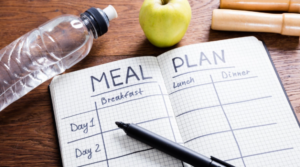Your goal is to make vast lifestyle improvements. We’re here to help you avoid making a mess of it by avoiding Vegetarian Pitfalls. Adopting a whole foods vegetarian diet can make you leaner, healthier, and happier, but you have to think ahead to make it a success. If you don’t plan and prepare for a healthy vegetarian journey, you’ll end up fat and frustrated. Not to mention nutritionally deficient. When you become vegetarian, you cannot just stop eating meats and dairy, you have to have replace those vitamin and mineral sources with healthy plant-based foods. If you don’t have a plan, you’re more likely to encounter the common pitfalls, which include low protein, simple carbs, and junk food snacks.
Meal Planning

By following a meal plan, you will be able to see what you are going to eat and you can shop to buy exactly what you need for the next few days. You can write your daily macronutrient needs on your meal plan to make sure that you get the necessary nutrition. The main benefit of meal planning is that you can shop and plan weekly for your meals, so you aren’t scrambling every day trying to figure out what to eat when you are hungry. Eating a balanced diet will ensure that you don’t fall into the trap of eating too much of the same foods. While nuts and seeds are great sources of healthy fat and protein, for example, too many of them are not healthy.
Keep Healthy Snacks

Keep healthy snacks in your cupboards, your car, at work, and in your handbag or backpack. Having healthy snacks on hand will give you nutritionally smart options to snack on instead of unhealthy or non-vegetarian foods.
Stay Hydrated
Drinking lots of water will help your body adjust to digesting a high-fiber diet. Try to drink a glass of water when you wake up and then continue to drink water throughout the day. You want to drink enough water so that your urine is pale yellow or clear.
Introduce New Foods Slowly

If you’ve been eating a Standard Western Diet and switched to a whole-food vegetarian diet, your digestive system may experience a shock. It won’t be pleasant. To avoid this ugly transitional symptom, introduce new foods slowly and allow your body time to learn how to digest them gradually. If you start eating an entirely new diet of unfamiliar foods, your body may be gassy and bloated for a few days and you may not feel satisfied. So take it easy at the beginning. Eat foods that taste good to you and try new foods one at a time.
Smarten Up

Contrary to what you see in the media you do not deserve to eat refined sugars, grains, and unhealthy foods. You deserve to eat healthy fresh whole foods that improve your health and give you energy. Eliminating meat doesn’t automatically equate to a healthy diet. Too often, new vegetarians substitute meat with crappy, empty calories that do nothing for your health. In fact, done wrong, a vegetarian diet could be worse for your health. Replace meat with other lean protein sources and lots of vegetables.

